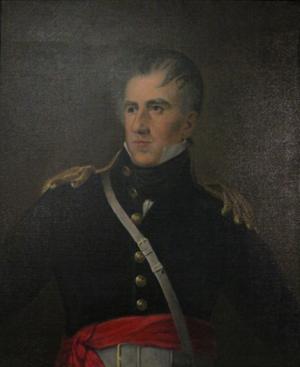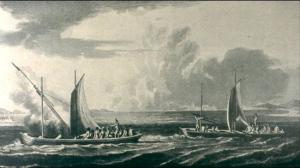Delaware's role in War of 1812 is topic May 17 of historical society program
One of the first big events to hit the shores of Sussex County was the arrival of a Royal Navy blockading squadron in the Delaware capes in March 1813. That’s when this 32-month military conflict that began in 1812 arrived in Delaware.
Delaware’s role during this war with the British is poorly known, according to Chuck Fithian, curator of archaeology with the Delaware Division of Historical and Cultural Affairs. He will bring his extensive knowledge about this conflict to the Lewes Historical Society Friday, May 17 when he presents “The Honour of the State Has Not Been Tarnished: Delaware in the War of 1812.”
The program begins at 7:30 p.m. in the Lewes Presbyterian Church Fellowship Hall, Kings Highway, Lewes.
With a background in colonial, military and maritime archaeology and history, material culture studies and social history, Fithian says, “The War of 1812 has always interested me. My interest was a natural given my background and the research I have done in historical and archeological research.”
Using archival images and maps, his presentation will provide an overview of the state’s participation in the conflict. He will discuss the many sites around Delaware associated with the war and will bring to light some of the issues regarding mobilization for war, the militia, and its organization and activities.
“While emphasis will be on the military dimensions of the War of 1812, I will also discuss how it affected Delaware politically, economically and socially,” he said.
Fithian recognizes some of the lore that over the years has clouded the historical facts such as the British firing on Lewes, which was portrayed in Barbara Mitchell’s book “Cornstalks and Cannonballs.” The book tells how the citizens of Lewes outwitted the British navy during the War of 1812. He says, “The recovery of British shot did happen. Records indicate they have been recovered. The cornstalks story is another matter. There is no evidence for that. However, the story, from an anthropological perspective, is interesting in it own right.”
His findings have been focused on keeping them specific to Delaware. “The more research we have done, the more complex the story has gotten. An uncritical use of historical resources and some of the myths have served to obscure the reality of the events.”
The public is invited to attend this talk on the conflict which had a profound effect on Lewes as well as the entire state. Light refreshments will be served following the presentation.
























































